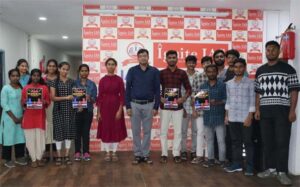
Hyderabad (Telangana) [India], December 21: In a stimulating exchange of ideas, Ignite IAS Academy hosted a spirited debate on the topic of ‘One Nation, One Election,’ a proposal that seeks to synchronize elections for the Lok Sabha and State Assemblies. The event witnessed fiery arguments, well-researched perspectives, and a deep dive into the political, constitutional, and logistical challenges associated with the proposal.
As the national discourse around simultaneous elections intensifies, the students of Ignite IAS showcased why debates like these are critical in shaping informed, analytical, and articulate future civil servants. The atmosphere was charged as participants passionately defended their stances, raising pertinent questions and exploring the nuances of this ambitious reform.
The Case for Simultaneous Elections
The proposition was strongly supported by students who argued that synchronized elections could revolutionize governance in India.
Prasanna, a proponent of the idea, argued, “Simultaneous elections would allow governments to focus on developmental activities and welfare programs without the constant interruptions caused by the Model Code of Conduct (MCC).” he emphasized that frequent elections disrupt governance and delay crucial policy decisions, and this reform could refocus government efforts on public welfare.
Dharmaavthaar added weight to the argument by pointing out the detrimental impact of the MCC on governance. “Policy paralysis caused by the MCC is a significant issue. Holding elections at the same time would ensure continuous governance and enable better implementation of long-term development projects,” he said.
The Opposition Weighs In
Not everyone in the room was convinced. The opposition raised substantial concerns about the feasibility and constitutional implications of the proposal.
Mythreyi, a vocal critic, highlighted the logistical challenges. “Simultaneous elections would require double the Electronic Voting Machines (EVMs) and extensive administrative resources. This would more than double the expenditure on elections,” she argued, questioning whether the financial strain was justifiable.
Ravalika took the debate to a constitutional plane, asserting that the proposal could violate the basic structure of India’s federal democracy. “The essence of federalism lies in the autonomy of states to conduct their own elections. Imposing a uniform electoral timeline risks diluting regional voices and centralizing power, which goes against the spirit of our Constitution,” she contended.
Expert Perspectives from Ignite IAS
Adding to the discussion, Dr. A.N. Reddy, Academic Dean at Ignite IAS, provided a balanced view. He remarked, “The concept of ‘One Nation, One Election’ is ambitious and has potential benefits, but it requires widespread consultations to address federal concerns and build consensus. The autonomy of states and the complexities of India’s governance structure cannot be overlooked.”
Mr. Chintam Srinivas Reddy, Founder and Chairman of Ignite IAS, commended the students for their eloquent arguments and thoughtful analysis. “Debates like these are an integral part of holistic learning at Ignite IAS. They not only build confidence and public speaking skills but also encourage critical thinking and informed decision-making, which are essential for future leaders,” he said.
Key Takeaways from the Debate
The debate delved into various aspects of the proposal, offering valuable insights into the potential impact of simultaneous elections:
- Governance and Policy Continuity:Proponents argued that synchronized elections would reduce governance disruptions caused by the MCC.
- Logistical Challenges:Critics emphasized the strain on infrastructure and resources, questioning the feasibility of nationwide synchronized elections.
- Impact on Federalism:Opponents raised concerns about the centralization of power and the marginalization of regional issues.
- Democratic Representation:Skeptics argued that simultaneous elections could overshadow local concerns, favoring national narratives over regional priorities.
A Platform for Future Leaders
The debate not only shed light on the intricacies of a critical national issue but also demonstrated Ignite IAS’s commitment to nurturing well-rounded individuals capable of addressing complex challenges. The students’ ability to articulate their arguments and critically analyze the issue was a testament to the academy’s focus on academic rigor and leadership development.
Ignite IAS continues to prepare students for the demands of the UPSC Civil Services Examination by encouraging them to engage with current affairs and develop a nuanced understanding of the socio-political landscape, said Pavan Kumar Director, Ignite IAS Academy.
Mr. N.S. Reddy, Director and Chief Mentor, is renowned for his strategic approach and guidance, empowering students to achieve top ranks in competitive exams. NS Reddy focuses on fostering innovation and a student-centric approach, ensuring students thrive in a competitive environment. The academy’s state-of-the-art facilities, rigorous test series, and interactive learning environment make it the best choice for IAS and CLAT aspirants in Hyderabad.




